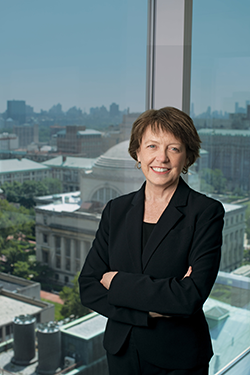Event
George Dieter Distinguished Lecture Series in Mechanics and Materials
Friday, April 26, 2024
11:00 a.m.-1:00 p.m.
Zupnik Forum, 1101 A. James Clark Hall
Alex Taliaferro
301 405 1364
alextali@umd.edu
The George Dieter Distinguished Lecture Series Presents Dr. Mary Boyce, Professor of Mechanical Engineering, Provost Emerita, and Dean Emerita, The Fu Foundation School of Engineering and Applied Science, Columbia University
 Lecture Title: "Mechanics of Soft Composites: The Interplay between Geometrical Structuring and Large Deformation to Achieve Novel Behavior"
Lecture Title: "Mechanics of Soft Composites: The Interplay between Geometrical Structuring and Large Deformation to Achieve Novel Behavior"
Reception: 11:00 a.m.
Lecture: 11:30 a.m.-12:00 p.m.
Registration requested. Click here to register.
ABSTRACT
Soft composites offer limitless avenues for the design and fabrication of materials and devices with remarkable properties and functional behaviors. Such materials are created through purposeful selection and embedding of a variety of material particles and structures within a soft matrix. By engineering the mechanical interaction between the geometrical organization of the constituent materials and the large deformation behavior of the soft matrix, one obtains composites with readily tunable properties and unique structural responses to external conditions.
In this talk, we explore the mechanics and design of soft composites through analytical and numerical modeling, as well as experiments on physical prototypes fabricated using multi-material 3D printing. These include patterned structures that are designed to exhibit deformation-induced structural transformations accompanied by a multitude of behaviors: superelastic and multilinear elastic response, enhanced mechanisms for energy storage, and the ability to manipulate wave propagation and alter phononic band gaps. Inspired by natural material systems, we also explore soft composite materials with alternating soft/stiff layered structures. We show that the discrete anisotropic nature of these engineered materials can be leveraged in the design of protective yet flexible armor and, separately, novel soft actuators that transform local compressive loading to large-scale rotational motion. Finally, also inspired by nature, we demonstrate the design and fabrication of a material with morphable surface topologies using the purposeful embedding of stiff particles in soft matrices.
BIO
Mary C. Boyce is Professor of Mechanical Engineering, Provost Emerita of Columbia University, and Dean Emerita of The Fu Foundation School of Engineering and Applied Science at Columbia University. Prior to joining Columbia in July 2013, Provost Boyce served on the faculty of the Massachusetts Institute of Technology for over 25 years, leading the Mechanical Engineering Department as Department Head from 2008 to 2013. Professor Boyce’s education and research efforts focus on the mechanics of materials, including theoretical, computational, and experimental approaches. Her research explores the nonlinear and multi-scale mechanics of polymeric materials and soft composites. Her leadership in the field of mechanics of materials has expanded the ability to model and predict the highly nonlinear time- and temperature-dependence of polymeric materials based on their underlying physics. Her research has expanded understanding of the interplay between micro-geometry and the inherent physical behavior of a material. Recognition for her scholarly contributions to the field include election as Fellow of the American Academy of Mechanics, the American Society of Mechanical Engineers, and to membership in the American Academy of Arts and Sciences and the National Academy of Engineering. Professor Boyce was awarded the 2015 Engineering Science Medal by the Society of Engineering Science and the 2020 Timoshenko Medal for Advances in Applied Mechanics by the American Society of Mechanical Engineers. She is the recipient of the 2024 Benjamin Franklin Medal in Mechanical Engineering from the Franklin Institute. In her past role as Dean, and together with faculty of The Fu Foundation School of Engineering and Applied Science, Professor Boyce introduced and developed the Columbia Engineering for Humanity strategic vision, spearheading the expansion of interdisciplinary research and education programs across the School and attracting faculty talent in cross-cutting fields as wide ranging as Data Science, Nano Science, Advanced Materials and Devices, Sustainability and Climate, and Engineering in Health and Medicine.
